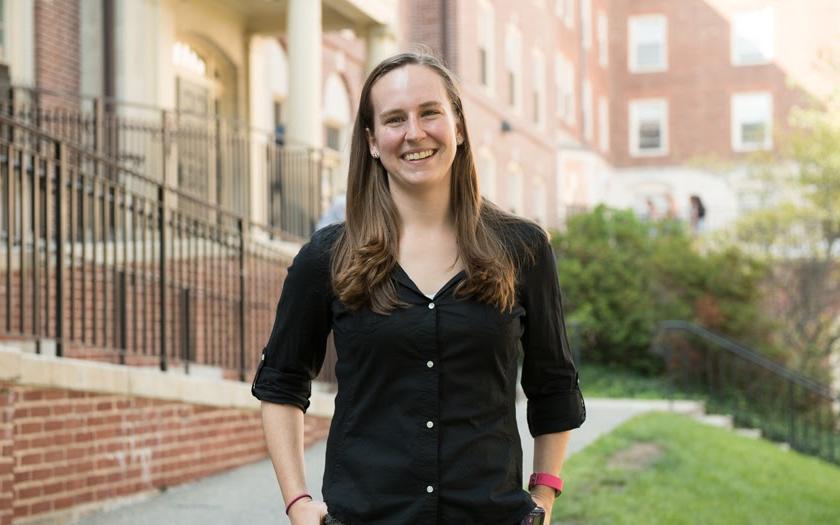August Student Spotlight - Megan Dempsey

Darling Lab
Doctoral Program - 2nd Year
1. When did you decide you wanted to pursue a PhD in biomedical engineering?
I worked in industry for two years after I graduated from WPI, and at all of internships and jobs, all of my bosses had PhDs. I’m very interested in going back into industry, and I realized that the easiest way to move up in a company as a scientist is to have a PhD. I’d rather spend the time now getting a valuable degree than trying to work my way up in one company without any guarantees of advancement.
2. What is the focus of your research?
The broader picture in our lab is that we are trying to isolate homogeneous populations of stem cells from tissue samples, specifically human adipose samples. My specific project is to design and develop a magnetically resonant molecular beacon, which is essentially a piece of DNA that can bind to its complementary sequence when it is being expressed in the body or in cells and be visualized in an MRI.
3. What has been the proudest accomplishment of your time in graduate school?
I’m about to publish a paper on this work. I took this project over from a previous graduate student in our lab. She had just started getting it to work before she left and now I’ve followed up and will be a co-first author on the paper. It’s pretty awesome because it is rare to be published by the end of your first year of grad school.
4. What has been the biggest challenge or frustration during grad school?
The first semester, I overloaded on classes and was simultaneously struggling to get into this research. Since I was taking the project over from someone else, I was trying to get my data to match her data and it wasn’t matching. I didn’t do enough research on my own about the background and take enough ownership of the project to understand why it wasn’t matching and realize that the results were actually still valid. So, that adjustment to grad school and research was tough, but it was a short period because classes only last for the first year and a half usually.
5. Have you ever done an experiment that didn’t work?
Yeah, of course. My first attempt at the synthesis for this molecule didn’t work. There’s a funny story, actually. For the synthesis, we use molecular-grade water with no contaminants that we order in bottles, and when I ordered it, I got a different brand than the lab had used before. After attempting the synthesis at least five times, I realized that the different brand of water was what was causing the failure of the synthesis.
6. How did you choose your mentor?
I was lucky in that Prof. Darling was persistent in expressing interest in having me in his lab and pursuing me as a student. I hadn’t actually listed him as one of my preferences in my application, but after seeing the applications, he contacted me. Although I still interviewed with other professors I had expressed interest in, he was the most available, informative and enthusiastic about me joining his lab. There’s a large diversity of projects to pursue in his lab and Prof. Darling is very good at mentoring, knowledgeable about writing and publishing papers and designing experiments. Overall, I think it’s worked out really well!
7. How was your project(s) chosen for grad school research? Did you get to pick or was a project assigned to you?
It was highly encouraged that I attempt to take over this project that had already been started because it was gaining momentum when I first got here. If it wasn’t working out, though, it was up to me to say so and suggest something else. Prof. Darling did ask me to come up with some alternative project ideas. There are quite a few challenges associated with scaling up this project and its very chemistry focused, which is neither my nor the labs strong suit, so I think that if I reach a point where I want to place a deadline on how long I’m willing to spend trying to get it to work, that would be acceptable. But for now it is going well.
8. What three qualities do you think are most important for someone entering graduate school?
Independent, have a thirst for knowledge and enthusiasm about your broad area of research, willing to seek out collaboration/help when needed
9. Where do you hope for your career to be in 5-10 years?
I definitely want to have my PhD within five years! Then, I’d like to be working in industry in a Scientist position. Most likely, I’d want to be in biopharmaceuticals, but there are also a lot of smaller startups around the Boston area doing a variety of cool things that I might be interested in.
Eventually I would like to be in a leadership role managing teams of people.